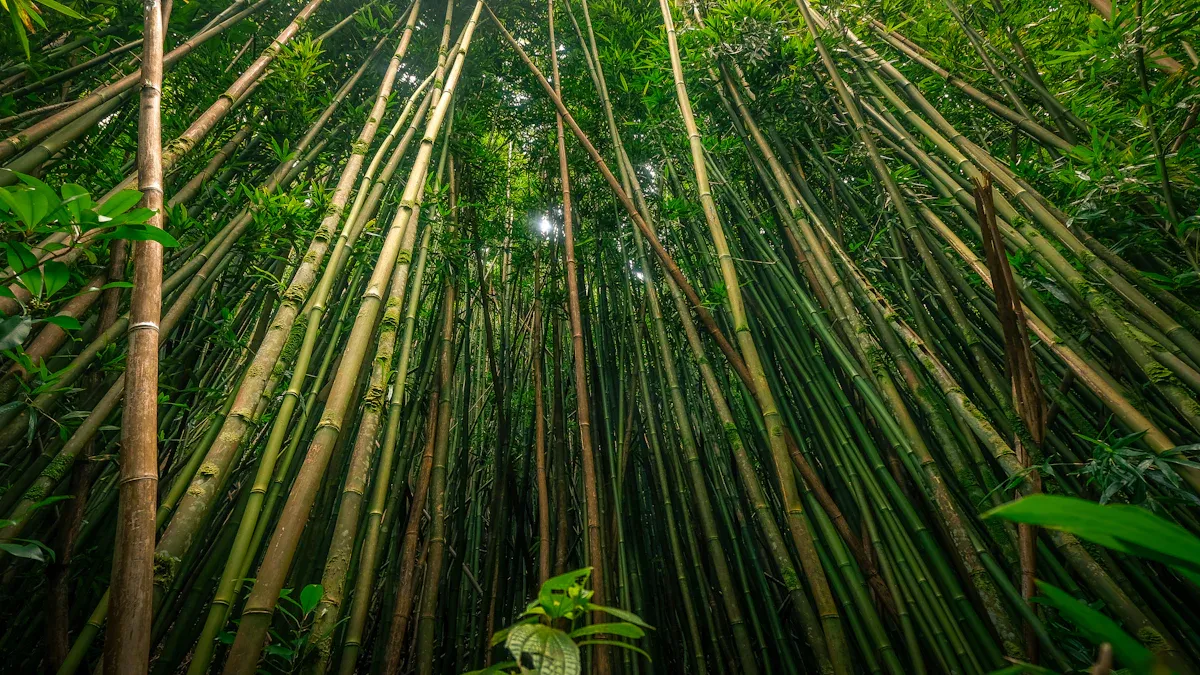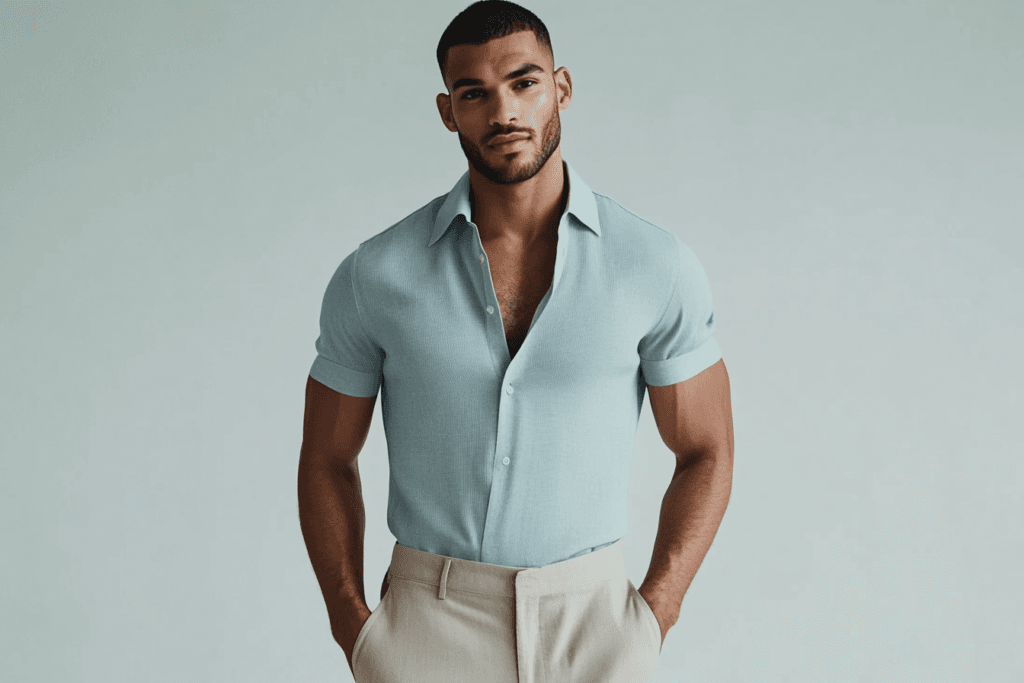
Bamboo fabric has gained attention in sustainable fashion for its eco-friendly qualities and practical benefits.
You might wonder why it stands out. First, bamboo grows quickly and requires minimal water, unlike cotton or synthetic materials. Its production often results in lower emissions, especially when brands use closed-loop systems to recycle chemicals. Additionally, bamboo fabric offers versatility.
You’ll find it in high-end fashion, activewear, and even home textiles. Its softness and breathability make it a favorite for consumers and brands focused on sustainability.
Bamboo’s rapid growth and low resource needs make it an environmentally friendly choice, aligning with the growing demand for sustainable materials in fashion.
Key Takeaways
- Bamboo plants grow fast and need little water, making them eco-friendly for sustainable fashion.
- Bamboo takes in more carbon dioxide than trees, helping fight climate change and lowering your carbon footprint.
- Picking bamboo fabric supports farming without harmful chemicals, keeping the environment healthier.
- Bamboo fabric breaks down naturally, cutting down landfill waste unlike synthetic materials.
- Bamboo fabric is soft and comfy, perfect for clothes and great for sensitive skin.
Environmental Benefits of Bamboo Fabric

Low Water Usage
Bamboo fabric stands out because of its minimal water requirements during cultivation. Unlike cotton, which demands approximately 10,000 liters of water to produce just one kilogram, bamboo grows rapidly without irrigation. It relies solely on natural rainfall, making it a sustainable choice for water conservation. This low water usage not only reduces the strain on freshwater resources but also makes bamboo a more eco-friendly alternative to other textile crops.
By choosing bamboo fabric, you support a material that thrives in water-scarce regions without depleting vital resources.
Carbon Sequestration
Bamboo plays a significant role in combating climate change. It absorbs five times more carbon dioxide than trees and produces 35% more oxygen. One acre of bamboo can capture up to 10,000 pounds of CO2 annually, acting as a powerful carbon sink. If bamboo were planted on 350 million hectares of degraded land by 2030, it could offset ten times the world’s annual CO2 emissions. This remarkable ability to fix carbon makes bamboo fabric a sustainable option for reducing your carbon footprint.
Bamboo’s rapid growth and high carbon absorption rates make it a champion in the fight against global warming.
Minimal Use of Pesticides and Fertilizers
Bamboo’s natural resilience eliminates the need for harmful chemicals. It contains an antimicrobial bio-agent called kun, which protects it from pests and diseases. This means bamboo can grow without pesticides, unlike cotton, which often requires heavy chemical use. Additionally, bamboo thrives in diverse environments and regenerates quickly, making it self-sufficient and less reliant on fertilizers. Its adaptability and toughness, with over 1,400 species, further highlight its sustainability.
When you choose bamboo fabric, you support farming practices that avoid toxic chemicals, protecting both the environment and human health.
Biodegradability
Bamboo fabric stands out for its ability to break down naturally, leaving no harmful residues behind. Unlike synthetic textiles, which can linger in landfills for decades, bamboo fabric decomposes quickly due to its 100% cellulose composition. This makes it an excellent choice for reducing waste and minimizing environmental impact.
When discarded, bamboo fabric typically biodegrades within 6 to 8 weeks under the right conditions. In comparison, cotton takes about 11 weeks, while plastic-based items can persist for up to 100 years. The following table highlights the biodegradation rates of bamboo fabric relative to other materials:
| Fabric Type | Biodegradation Time | Notes |
|---|---|---|
| Bamboo Fabric | 6 to 8 weeks | 100% cellulose, biodegradable |
| Cotton | 11 weeks | Decomposes slower than bamboo |
| Plastic-based items | Up to 100 years | Takes significantly longer to decompose |
This rapid decomposition rate makes bamboo fabric a sustainable option for reducing landfill waste. You can feel confident knowing that when bamboo fabric reaches the end of its life cycle, it returns to the earth without polluting the environment.
Choosing bamboo fabric helps you contribute to a cleaner planet by supporting materials that naturally break down and reduce long-term waste.
Practical Advantages of Bamboo Fabric
Comfort and Softness
Bamboo fabric offers exceptional comfort, making it a favorite for clothing and bedding. Its fibers are naturally smooth, which gives the material a silky texture that feels gentle on your skin. Unlike cotton, bamboo fabric lacks the roughness that can sometimes cause irritation. This makes it ideal for people with sensitive skin or those seeking a luxurious feel in their garments.
A comparison of bamboo fabric and cotton highlights its superior qualities:
| Feature | Bamboo Fabric | Cotton |
|---|---|---|
| Softness | Exceptionally soft | Lacks the silky quality |
| Temperature Regulation | Excellent | Good |
| Odor Resistance | High | Low |
You’ll notice that bamboo fabric not only feels softer but also excels in regulating temperature and resisting odors. These qualities make it a practical choice for everyday wear, especially in warm or humid climates.
If you value comfort and softness, bamboo fabric provides a luxurious experience while being eco-friendly.
Antibacterial and Hypoallergenic Properties
Bamboo fabric stands out for its antibacterial and hypoallergenic properties. Research shows that it can eliminate up to 99.8% of bacteria within 24 hours. This makes it a great option for reducing odors and keeping your clothes fresher for longer. Even after 50 washes, bamboo retains 70% of its antibacterial effectiveness, according to the Japan Textile Inspection Association.
Its hypoallergenic nature also makes it suitable for people with allergies or sensitive skin. Unlike synthetic fabrics, bamboo doesn’t cause irritation or trigger allergic reactions. You can wear bamboo-based clothing with confidence, knowing it promotes better hygiene and comfort.
Bamboo fabric’s antibacterial and hypoallergenic qualities make it a healthier choice for you and your family.
Durability and Longevity
Bamboo fabric offers impressive durability, ensuring your clothes last longer. It resists pilling and shrinking, maintaining its quality even after repeated use. While pure bamboo fabric requires gentle washing, blends with cotton improve abrasion resistance, making it suitable for everyday wear.
Here’s how bamboo compares to cotton in terms of durability:
| Feature | Bamboo | Cotton |
|---|---|---|
| Lifespan | Longer due to resistance to pilling and shrinking | Shorter, frequent replacements needed |
| Strength when wet | Remains strong, less prone to damage | Highly durable, suitable for rugged use |
By choosing bamboo fabric, you reduce the need for frequent replacements, saving money and resources. Its longevity aligns with sustainable fashion principles, helping you minimize waste while enjoying high-quality clothing.
Bamboo fabric combines strength and sustainability, making it a reliable choice for long-lasting apparel.
Moisture-Wicking and Thermal Regulation
Bamboo fabric excels in keeping you comfortable by managing moisture and regulating temperature. Its unique structure allows it to absorb and wick away sweat efficiently, keeping your skin dry even during intense activities. This makes it a great choice for activewear, undergarments, and summer clothing.
Compared to cotton, bamboo fabric can hold up to three times its weight in water. Its moisture absorption capacity is 60% higher, ensuring that sweat doesn’t linger on your skin. This feature not only enhances comfort but also reduces the chances of skin irritation caused by dampness.
| Characteristic | Bamboo | Cotton |
|---|---|---|
| Moisture Absorption | Can hold 3x its weight in water; 60% higher absorption capacity | Lower absorption capacity |
| Temperature Regulation | 2-3°C cooler than ambient temperature | Not specifically mentioned |
In addition to moisture-wicking, bamboo fabric offers excellent thermal regulation. It keeps you cool in hot weather by staying 2-3°C cooler than the surrounding temperature. This cooling effect comes from its breathable fibers, which allow air to circulate freely. During colder months, bamboo fabric provides insulation by trapping warm air close to your body.
These qualities make bamboo fabric a versatile option for year-round wear. Whether you’re exercising, lounging, or braving extreme weather, it adapts to your needs. You’ll stay dry, comfortable, and at the right temperature, no matter the conditions.
If you’re looking for clothing that keeps you cool, dry, and comfortable, bamboo fabric offers a natural solution with superior performance.
Bamboo Fabric’s Role in Sustainable Fashion

Promoting Circular Fashion
You play a vital role in supporting circular fashion by choosing bamboo fabric. This material aligns with the principles of a circular economy, which focuses on reducing waste and reusing resources. Bamboo grows rapidly with minimal water, making it a renewable resource. Its production often involves closed-loop systems, where chemicals and water are recycled during manufacturing. These systems significantly reduce environmental toxins and emissions, ensuring a more sustainable process.
The bamboo textile market continues to grow as more consumers like you prefer eco-friendly options. Brands now incorporate bamboo fabric into casual and activewear due to its comfort and sustainability. Innovations such as antimicrobial properties and breathable designs further enhance its appeal.
By opting for bamboo fabric, you contribute to a system that minimizes waste and promotes resource recovery, helping the fashion industry become more sustainable.
Reducing Fast Fashion’s Footprint
Fast fashion has a significant environmental impact, but bamboo fabric offers a solution. Its production requires fewer resources compared to conventional fabrics, reducing the overall carbon footprint. Closed-loop manufacturing processes, like those used for Monocel®, recycle solvents and minimize emissions. These methods align with sustainable practices, making bamboo fabric a better alternative to fast fashion’s wasteful production.
You can also extend the life of your wardrobe by choosing durable bamboo-based clothing. Its longevity reduces the need for frequent replacements, which helps combat the throwaway culture of fast fashion.
When you choose bamboo fabric, you actively reduce the environmental damage caused by fast fashion and support a more sustainable future.
Supporting Ethical Practices
Bamboo fabric supports ethical practices in the fashion industry. Sustainable sourcing ensures that bamboo is harvested responsibly, promoting better forestry practices. Additionally, closed-loop technologies improve water and energy recovery during production, reducing harm to the environment.
Many brands now prioritize transparency and fair labor practices when producing bamboo textiles. By purchasing bamboo-based clothing, you support companies that value ethical manufacturing and worker welfare.
| Aspect | Description |
|---|---|
| Sustainable Sourcing | Bamboo is sourced sustainably, promoting responsible forestry practices. |
| Closed-Loop Manufacturing | Technologies have emerged to produce bamboo fibers in closed-loop systems, minimizing environmental impact. |
| Resource Recovery | New methods improve the recovery of water and energy used in manufacturing processes. |
Supporting bamboo fabric means you advocate for ethical practices and a more responsible fashion industry.
Bamboo fabric offers a unique combination of environmental and practical benefits, making it a cornerstone of sustainable fashion. Its rapid growth and minimal resource needs position it as a sustainable alternative to traditional textiles. Closed-loop production systems further enhance its eco-friendly appeal by reducing chemical waste and energy use.
You also benefit from its exceptional qualities, such as softness, breathability, and durability. These features ensure comfort while promoting a longer-lasting wardrobe. By choosing bamboo fabric, you support a shift toward circular fashion and help reduce the environmental footprint of fast fashion. Together, these efforts contribute to a more ethical and sustainable future for the fashion industry.
🌱 Tip: Opting for bamboo fabric not only elevates your style but also helps protect the planet for future generations.
FAQ
Why is bamboo fabric considered eco-friendly?
Bamboo fabric is eco-friendly because bamboo grows quickly, requires minimal water, and doesn’t need pesticides. Its production often uses closed-loop systems, which recycle chemicals and reduce waste. These factors make it a sustainable choice compared to traditional textiles.
🌱 Tip: Look for certifications like OEKO-TEX® to ensure eco-friendly bamboo fabric.
Why does bamboo fabric feel softer than cotton?
Bamboo fibers are naturally smooth and round, which gives the fabric a silky texture. This structure reduces skin irritation and makes bamboo fabric softer than cotton. Its luxurious feel makes it ideal for sensitive skin and comfortable clothing.
Why is bamboo fabric better for sensitive skin?
Bamboo fabric contains natural antibacterial properties and lacks harsh chemicals. Its hypoallergenic nature prevents irritation, making it suitable for people with allergies or sensitive skin. You can wear bamboo-based clothing confidently without worrying about discomfort.
Why does bamboo fabric last longer than other materials?
Bamboo fabric resists pilling and shrinking, maintaining its quality over time. Its durability reduces the need for frequent replacements, aligning with sustainable fashion principles. Blends with cotton enhance its strength, making it suitable for everyday use.
Why is bamboo fabric a good choice for activewear?
Bamboo fabric wicks moisture effectively and regulates temperature. It absorbs sweat, keeping your skin dry during workouts. Its breathable fibers also keep you cool in summer and warm in winter, making it versatile for year-round activewear.
🏃 Note: Bamboo activewear combines performance with sustainability, perfect for eco-conscious fitness enthusiasts.
